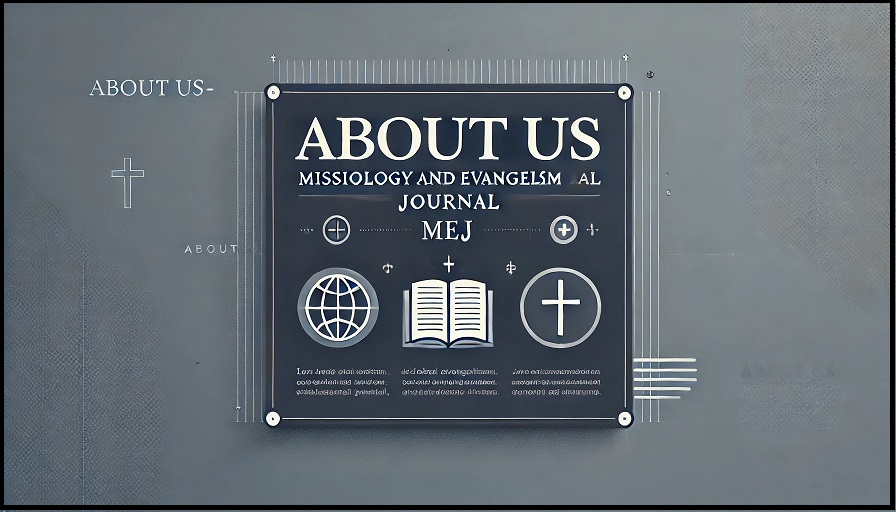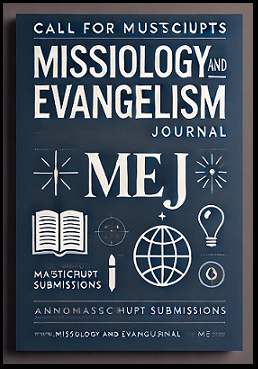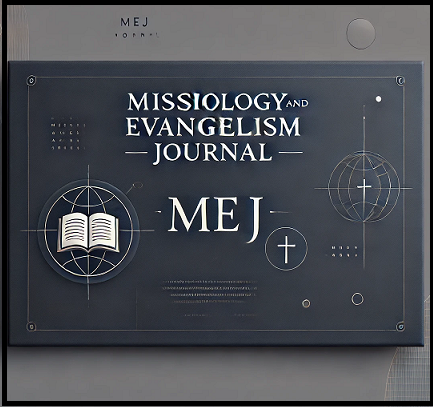Journal Aims and Scope
The Missiology and Evangelism Journal aims to advance scholarly research and practical knowledge in the fields of Christian mission and evangelism. The journal seeks to equip theologians, practitioners, educators, and church leaders with insights that are biblically grounded, theologically sound, and culturally relevant. .
Aims:
- To foster critical reflection on the theological foundations of mission and evangelism.
- To promote innovative strategies for effective Gospel proclamation and discipleship.
- To bridge the gap between academic research and practical application in global mission contexts.
- To encourage dialogue on the challenges and opportunities of evangelism in diverse cultural, social, and religious settings.
Scope:
The journal publishes research and analysis on topics such as:
- Biblical and theological perspectives on mission.
- Missional approaches to church growth and discipleship.
- Evangelism in urban, rural, and cross-cultural settings.
- Historical developments and trends in global missions.
- Interdisciplinary studies, including sociology, anthropology, and communication, as they relate to mission and evangelism.
The Missiology and Evangelism Journal is a platform for advancing the global conversation on spreading the Gospel and fulfilling the Great Commission in a rapidly changing world.
Open Access
The Missiology and Evangelism Journal (MEJ) operates as a fully open-access journal, ensuring that all published articles are freely available to readers worldwide without any subscription fees. This model is intended to promote the widespread dissemination of research findings and enhance the accessibility of Missiology and Evangelism scholarship to a diverse audience, including academics, students, clergy, and interested laypersons.
Article-Processing Charges (APCs)
To support its open-access model, MEJ charges an Article Processing Charge (APC) to cover editorial and production costs. However, to encourage submissions and recognize the contributions of early adopters, MEJ offers waived APCs for the first 10 accepted articles. Following this introductory period, authors will be required to pay a standard APC, details of which will be transparently provided on the journal's website.
Publication and peer review process
The entire process is designed to take 6–12 weeks from submission to publication, depending on the extent of revisions required.Content overview
The publication process for MEJ is rigorous, transparent, and designed to maintain the highest standards of scholarly integrity:
Ethical Guidelines
MEJ adheres to strict ethical standards based on the guidelines of the Committee on Publication Ethics (COPE). Authors, reviewers, and editors are expected to uphold principles of integrity, accountability, and transparency. Key aspects include:
Any allegations of misconduct will be investigated thoroughly, and appropriate actions, including article retractions, may be taken.
Data and Materials Release
To promote reproducibility and transparency, MEJ encourages authors to make all relevant data, materials, and resources underlying their research available upon publication. Authors can provide supplementary materials as appendices or upload datasets to publicly accessible repositories, with proper links included in the article.
Competing Interests
Authors must disclose any potential conflicts of interest that could influence their research, interpretation, or reporting. This includes financial, institutional, personal, or professional relationships. The editorial team evaluates all disclosures to ensure the impartiality and credibility of the published work.
Plagiarism Detection
MEJ employs advanced plagiarism detection software to ensure that all submitted manuscripts are original and free from plagiarism. Any manuscript found to contain significant plagiarism or uncredited use of another author's work will be rejected, and further actions may be taken against the submitting author.
Copyright
The Missiology and Evangelism Journal operates under a Creative Commons Attribution (CC BY) license. This allows authors to retain copyright of their work while granting the journal permission to publish it. Readers and researchers are permitted to share, adapt, and use the content, provided proper credit is given to the authors and the journal.
This approach supports both the dissemination of knowledge and the recognition of authors’ contributions to the field.
MEJ is committed to creating an inclusive, transparent, and rigorous academic platform for Missiology and Evangelism Journal. Whether you are an established scholar or an early-career researcher, MEJ welcomes your contribution to this growing body of knowledge.



